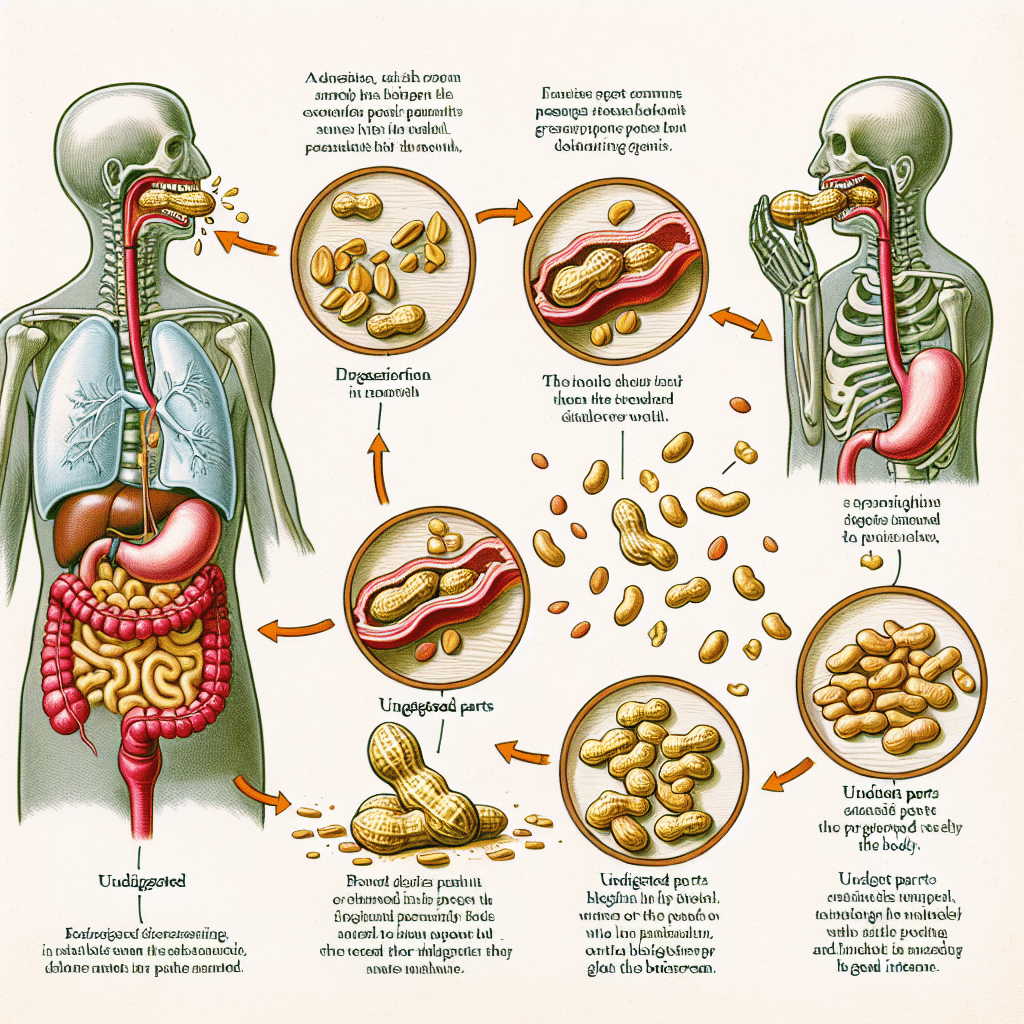Are Peanuts Hard To Digest?
-
Table of Contents
- Are Peanuts Hard to Digest? Unpacking the Nutritional Complexities
- Understanding the Digestive Challenges of Peanuts
- Individual Digestive Responses to Peanuts
- Nutritional Benefits of Peanuts
- Strategies to Improve Peanut Digestibility
- Case Studies and Statistics
- Conclusion: Balancing Digestion with Nutritional Benefits
- Discover ETprotein’s High-Quality Protein Products
Are Peanuts Hard to Digest? Unpacking the Nutritional Complexities

Peanuts are a popular snack enjoyed by millions worldwide, known for their rich flavor and high nutritional value. However, there’s a common question that often arises: Are peanuts hard to digest? This article delves into the digestive aspects of peanuts, examining their nutritional components, how they affect the digestive system, and what this means for different individuals.
Understanding the Digestive Challenges of Peanuts
Peanuts, like all nuts, are dense in nutrients and contain a mix of proteins, fats, and carbohydrates. Their complex structure can make them more challenging to digest for some people. Here’s why:
- High Fat Content: Peanuts are high in fats, particularly monounsaturated and polyunsaturated fats. While these are healthy fats, they slow down the digestive process because fat takes longer to break down in the system.
- Fiber: Peanuts are also a good source of dietary fiber. Fiber is beneficial for digestive health, but it can cause issues for individuals with sensitive digestive systems or conditions like irritable bowel syndrome (IBS).
- Protein: The protein in peanuts is plant-based and can be harder to digest compared to animal proteins. This is due to the presence of complex amino acid chains and anti-nutrients that can inhibit digestion.
- Anti-Nutrients: Peanuts contain anti-nutrients like phytic acid, which can bind to minerals and reduce their absorption. Soaking, sprouting, or roasting peanuts can reduce these compounds but not eliminate them entirely.
Individual Digestive Responses to Peanuts
How well an individual digests peanuts can vary greatly. Some people can consume peanuts without any issues, while others may experience discomfort or digestive problems. Factors influencing this include:
- Enzyme Production: The body’s ability to produce enzymes that break down fats and proteins affects how well it can digest peanuts.
- Gut Flora: The composition of one’s gut microbiota plays a role in digesting fibers and other components of peanuts.
- Chewing Habits: Thoroughly chewing peanuts can significantly aid in digestion by mechanically breaking them down before they reach the stomach.
- Pre-existing Digestive Conditions: People with conditions like IBS, Crohn’s disease, or nut allergies may find peanuts particularly hard to digest.
Nutritional Benefits of Peanuts
Despite the potential digestive issues, peanuts are packed with nutrients that offer various health benefits:
- Heart Health: The monounsaturated and polyunsaturated fats in peanuts can help lower bad cholesterol levels and reduce the risk of heart disease.
- Weight Management: Peanuts have a high satiety factor, which can help control appetite and support weight management.
- Antioxidants: Peanuts contain antioxidants like resveratrol, which can help combat oxidative stress and reduce the risk of chronic diseases.
- Protein: As a good source of plant-based protein, peanuts can support muscle repair and growth.
Strategies to Improve Peanut Digestibility
For those who find peanuts hard to digest, there are several strategies that can help:
- Soaking and Sprouting: These processes can reduce anti-nutrients and make peanuts easier to digest.
- Roasting: Lightly roasting peanuts can break down some of the proteins and fats, making them more digestible.
- Portion Control: Eating peanuts in moderation can prevent overloading the digestive system.
- Combining with Other Foods: Eating peanuts with other foods, especially those high in vitamin C, can improve mineral absorption.
Case Studies and Statistics
Research on peanut digestion is ongoing, but several studies have provided insights into how peanuts affect the digestive system:
- A study published in the Journal of Nutrition found that the bioavailability of nutrients in peanuts is enhanced when consumed as part of a balanced diet.
- Statistics from the National Institute of Allergy and Infectious Diseases indicate that peanut allergies, which can severely affect digestion, affect approximately 1% of the population in the United States.
Conclusion: Balancing Digestion with Nutritional Benefits
In conclusion, while peanuts can be hard to digest for some individuals, they offer a wealth of nutritional benefits that can contribute to a healthy diet. Understanding one’s digestive response to peanuts and employing strategies to improve their digestibility can help maximize their health advantages. As with any food, moderation and mindful eating are key.
Discover ETprotein’s High-Quality Protein Products
If you’re looking for alternative protein sources that are easy to digest, consider ETprotein’s range of organic bulk vegan proteins. Their products, including peanut protein, are designed to cater to various dietary needs and preferences, ensuring that you can enjoy the benefits of protein without compromising on digestibility.
About ETprotein:
ETprotein, a reputable protein and L-(+)-Ergothioneine (EGT) Chinese factory manufacturer and supplier, is renowned for producing, stocking, exporting, and delivering the highest quality organic bulk vegan proteins and L-(+)-Ergothioneine. They include Organic rice protein, clear rice protein, pea protein, clear pea protein, watermelon seed protein, pumpkin seed protein, sunflower seed protein, mung bean protein, peanut protein, and L-(+)-Ergothioneine EGT Pharmaceutical grade, L-(+)-Ergothioneine EGT food grade, L-(+)-Ergothioneine EGT cosmetic grade, L-(+)-Ergothioneine EGT reference grade and L-(+)-Ergothioneine EGT standard. Their offerings, characterized by a neutral taste, non-GMO, allergen-free attributes, with L-(+)-Ergothioneine purity over 98%, 99%, cater to a diverse range of industries. They serve nutraceutical, pharmaceutical, cosmeceutical, veterinary, as well as food and beverage finished product distributors, traders, and manufacturers across Europe, USA, Canada, Australia, Thailand, Japan, Korea, Brazil, and Chile, among others.
ETprotein specialization includes exporting and delivering tailor-made protein powder and finished nutritional supplements. Their extensive product range covers sectors like Food and Beverage, Sports Nutrition, Weight Management, Dietary Supplements, Health and Wellness Products, and Infant Formula, ensuring comprehensive solutions to meet all your protein needs.
As a trusted company by leading global food and beverage brands and Fortune 500 companies, ETprotein reinforces China’s reputation in the global arena. For more information or to sample their products, please contact them and email sales(at)ETprotein.com today.














